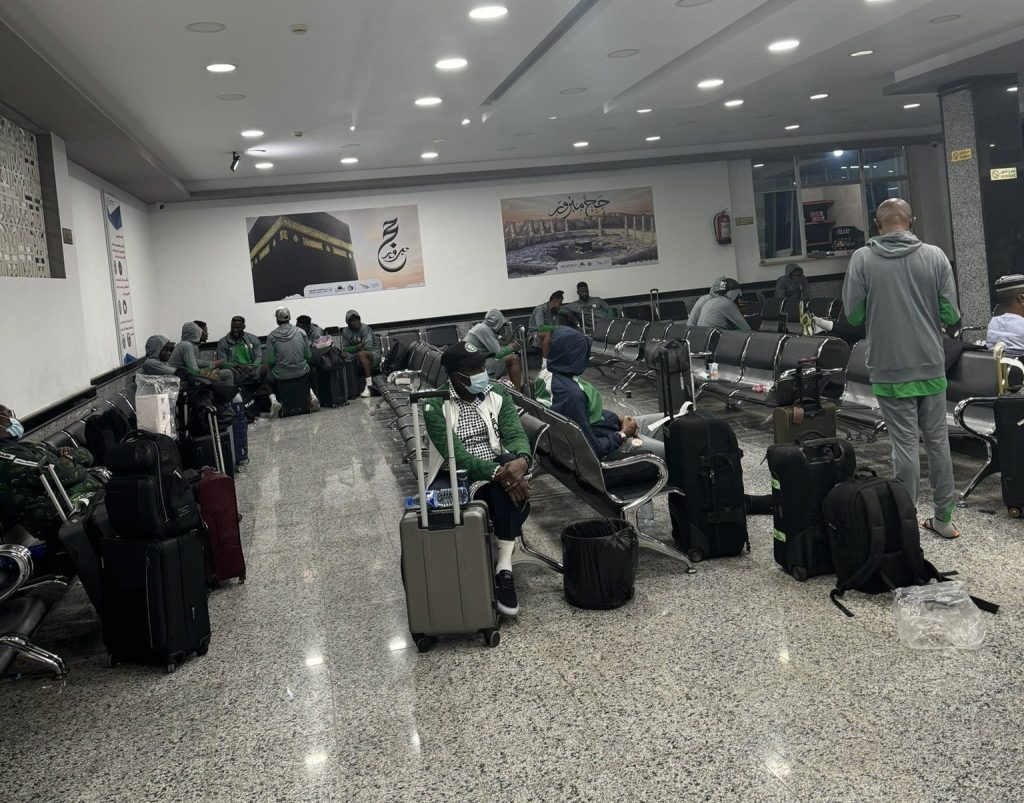Super Eagles Return to Abuja After Controversial AFCON Qualifier Boycott
3 min read
Super Eagles arrive in Nigeria

Super Eagles arrive in Nigeria
The Nigerian Super Eagles squad has returned to Abuja following their decision to boycott an AFCON qualifier match in Libya. The team’s withdrawal stemmed from a harrowing experience where players were stranded overnight at an airport, which the captain described as a case of “mind games.”
Initially scheduled to land in Benghazi on Sunday, the team’s flight was unexpectedly diverted to Al Abraq, located over 200 kilometers from their intended destination. The players found themselves in a distressing situation, described by a Nigeria Football Federation (NFF) official as being “abandoned” and locked inside the airport terminal.
The chairman of the House Committee on Sports, Kabiru Amadu, expressed his shock at the experience but also voiced relief upon their safe return. “This trip, I wouldn’t say it was okay, but we thank God that we went and came back safe. But it was a hostage situation,” Amadu stated, highlighting the severity of the ordeal the players faced.
In response to the incident, the Libyan Football Federation expressed its concern but dismissed claims of any wrongdoing. They emphasized that the situation was regrettable but insisted that there was no intention to create discomfort for the visiting team.
The Super Eagles’ boycott of the match underscores the growing tensions surrounding international fixtures, particularly in regions facing instability. Players and officials have increasingly voiced concerns about their safety while traveling for games, especially in countries where political and social unrest is prevalent.
Following the incident, discussions have emerged regarding the need for better logistical planning and security arrangements for teams traveling to potentially volatile locations. Many believe that international sporting bodies must take more responsibility in ensuring the safety of athletes during such events.
The Nigerian team’s decision to boycott the qualifier has significant implications for their standing in the AFCON tournament. Such actions can lead to sanctions or fines from the Confederation of African Football (CAF), impacting not just the current tournament but also the future of the team.
As the Super Eagles regroup in Abuja, the focus will now shift to their upcoming fixtures and preparations for future matches. The experience in Libya may serve as a wake-up call, prompting both the NFF and players to reassess their strategies regarding travel and participation in international competitions.
With the landscape of international football continually evolving, the intersection of politics, safety, and sportsmanship is becoming more pronounced. The situation faced by the Super Eagles may lead to increased dialogue about the responsibilities of host nations and the importance of player safety.
Moving forward, the hope is that such incidents will prompt reforms that prioritize the well-being of athletes while also upholding the integrity of international competitions. As teams prepare for their matches, the commitment to creating a safe environment for players will remain a crucial aspect of the discussion within the football community.
In summary, the Super Eagles’ experience in Libya highlights not only the challenges faced by teams traveling to conflict-affected regions but also the urgent need for comprehensive measures to ensure their safety. As the players return to training and preparation, the focus will inevitably shift to ensuring a more secure environment for future competitions, reflecting the broader concerns of the international sports community.